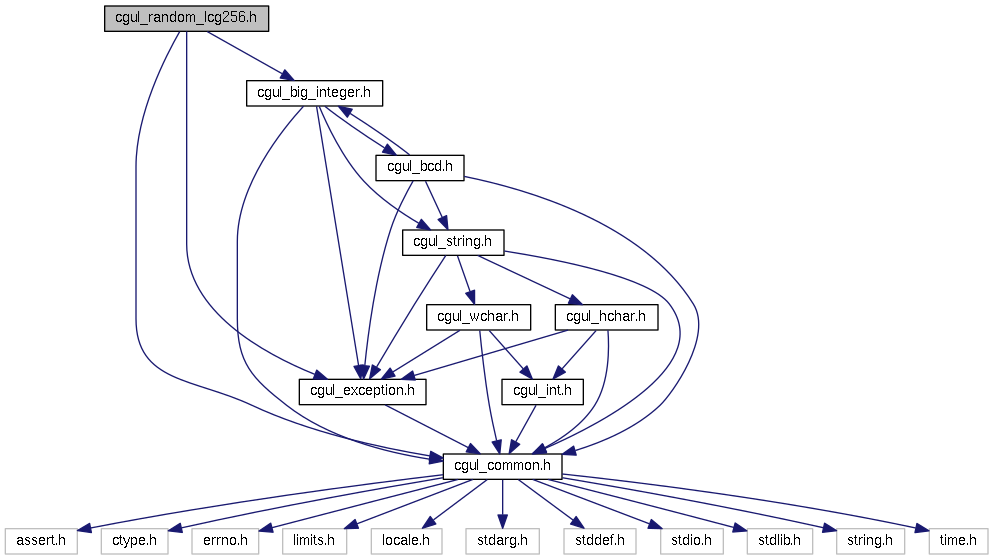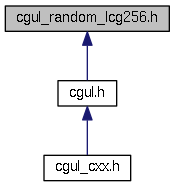256-bit PRNG (LCG) More...


Typedefs | |
| typedef typedefCGUL_BEGIN_C struct cgul_random_lcg256 * | cgul_random_lcg256_t |
Functions | |
| CGUL_EXPORT cgul_random_lcg256_t | cgul_random_lcg256__new (cgul_exception_t *cex) |
| CGUL_EXPORT cgul_random_lcg256_t | cgul_random_lcg256__new_from_seed (cgul_exception_t *cex, cgul_big_integer_t seed) |
| CGUL_EXPORT void | cgul_random_lcg256__delete (cgul_random_lcg256_t r) |
| CGUL_EXPORT void | cgul_random_lcg256__next (cgul_exception_t *cex, cgul_random_lcg256_t r, cgul_big_integer_t next) |
| CGUL_EXPORT void | cgul_random_lcg256__next_in_range (cgul_exception_t *cex, cgul_random_lcg256_t r, cgul_big_integer_t next, cgul_big_integer_t range_max) |
Detailed Description
256-bit linear congruential pseudo-random number generator.
Typedef Documentation
§ cgul_random_lcg256_t
| typedef typedefCGUL_BEGIN_C struct cgul_random_lcg256* cgul_random_lcg256_t |
Opaque pointer to a cgul_random_lcg256 instance.
Function Documentation
§ cgul_random_lcg256__new()
| CGUL_EXPORT cgul_random_lcg256_t cgul_random_lcg256__new | ( | cgul_exception_t * | cex | ) |
Create a new cgul_random_lcg256 object seeding it with the value returned by time(), i.e., the 32-bit seconds since the epoch. The caller is responsible for freeing the object by calling cgul_random_lcg256__delete(). If memory cannot be allocated, NULL is returned, and an exception is thrown.
- Parameters
-
[in,out] cex c-style exception
- Returns
- new
cgul_random_lcg256instance
§ cgul_random_lcg256__new_from_seed()
| CGUL_EXPORT cgul_random_lcg256_t cgul_random_lcg256__new_from_seed | ( | cgul_exception_t * | cex, |
| cgul_big_integer_t | seed | ||
| ) |
Create a new cgul_random_lcg256 object seeding it with the value the user passes in seed. The caller is responsible for freeing the object by calling cgul_random_lcg256__delete(). If memory cannot be allocated, NULL is returned, and an exception is thrown.
- Parameters
-
[in,out] cex c-style exception [in] seed seed value
- Returns
- new
cgul_random_lcg256instance
§ cgul_random_lcg256__delete()
| CGUL_EXPORT void cgul_random_lcg256__delete | ( | cgul_random_lcg256_t | r | ) |
This method frees all internally allocated memory. Do not attempt to dereference r after calling this method.
- Parameters
-
[in] r cgul_random_lcg256instance
§ cgul_random_lcg256__next()
| CGUL_EXPORT void cgul_random_lcg256__next | ( | cgul_exception_t * | cex, |
| cgul_random_lcg256_t | r, | ||
| cgul_big_integer_t | next | ||
| ) |
The next element in the random number sequence is returned in next. The random numbers returned are 256 bits wide. It is possible to generate larger random numbers by calling cgul_random_lcg256__next_in_range() which will assemble the larger numbers from multiple iterations of the generator.
The most common LCG implementation is to use a modulus that is a power of 2 allowing the modulo operation to be performed with a simple bit mask or intrinsic modulo 2 arithmetic (depending on the data type). The cgul_random_lcg256 implementation is no different; however, this results in the well-known problem that LCGs are non-random in their low-order bits. Specifically, the nth bit has a period of 2^n. Thus, the least-significant bit only has a period of 2 meaning it always just toggles between 0 and 1.
The way to get around this problem is to discard the low-order bits. This can be done by shifting to the right the value returned by this function or by using cgul_random_lcg256__next_in_range() which returns numbers based much more heavily on the high order bits.
- Note
- Do not use the value returned by this function without compensating for the non-random low-order bits (as described above).
- Parameters
-
[in] cex c-style exception [in] r cgul_random_lcg256instance[out] next next element in the random number sequence
§ cgul_random_lcg256__next_in_range()
| CGUL_EXPORT void cgul_random_lcg256__next_in_range | ( | cgul_exception_t * | cex, |
| cgul_random_lcg256_t | r, | ||
| cgul_big_integer_t | next, | ||
| cgul_big_integer_t | range_max | ||
| ) |
If the value returned by cgul_random_lcg256__next() is not the exact range that is needed, this method can limit or extend the return value to [0, range_max). If range_max is larger than the number of bits that can be generated in one iteration, multiple iterations will be used. If the range needs to be extended beyond what can be generated in a single iteration, the Blum-Blum-Shub generator in cgul_random_bbs is probably a better choice.
It is highly recommended that this method be used when mapping the random numbers to a smaller range because (like most LCGs), the low order bits of this LCG are known to repeat much more quickly than all the bits taken as a whole. This method takes this problem into account to return a suitable pseudo-random number.
- Parameters
-
[in] cex c-style exception [in] r cgul_random_lcg256instance[out] next next element in the random number sequence [in] range_max exclusive limit on the maximum value returned
